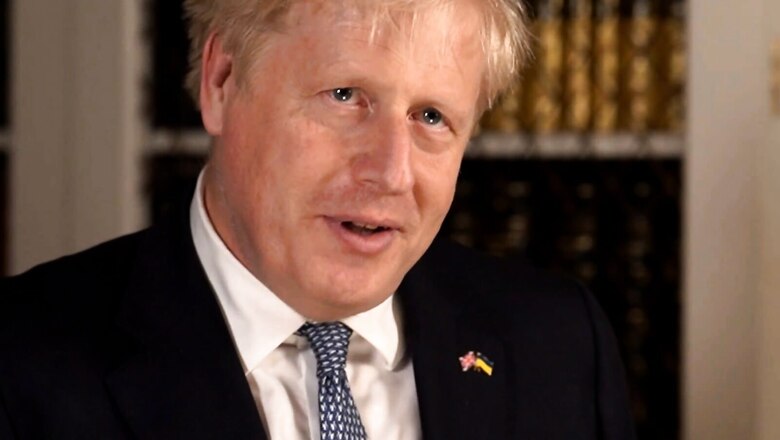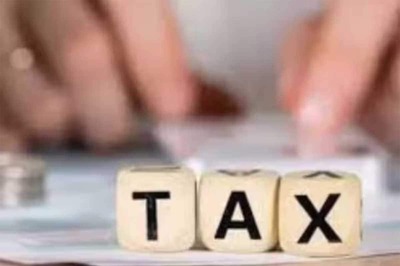
views
Prime Minister Boris Johnson will on Thursday outline plans to tackle Britain’s cost-of-living crisis, as he seeks to move on from a damaging series of scandals and a confidence vote called by his own MPs.
Johnson won the vote but with 40 percent of his own side refusing to back him, he was likened to a “Monty Python” character who refuses to admit he is mortally wounded following another harrowing week.
The Conservative leader on Wednesday faced parliament for the first time since surviving the vote, which commentators said had left his scandal-tainted premiership still in peril.
Backers in the House of Commons staged a noisy show of support at his weekly question-and-answer session. But Tory rebels sitting behind looked glum and laughed along with opposition jibes.
Johnson has called his 211-148 victory “decisive” and wants to move on from repeated calls for him to resign over the “Partygate” scandal about lockdown-breaching parties in Downing Street.
“As for jobs, I’m going to get on with mine,” he reiterated in the Commons, after defending his government’s record on employment, health and Ukraine.
Part of the reset includes a speech in northwest England on Thursday to “set out a clear vision to continue to tackle the rising cost of living”, his Downing Street office said.
“We have the tools we need to get on top of rising prices. The global headwinds are strong. But our engines are stronger,” he will say.
“And, while it’s not going to be quick or easy, you can be confident that things will get better, that we will emerge from this a strong country with a healthy economy.”
Policy rollout
Johnson faced repeated taunts on Wednesday about Monday’s vote, including comparisons to Monty Python’s “Black Knight” character, who declares “it’s just a flesh wound” when he has his arms and legs chopped off in a duel.
“No amount of delusion and denial will save the prime minister from the truth: this story won’t go away until he goes away,” said the Scottish National Party’s Westminster leader Ian Blackford.
Johnson’s Tory opponents fear that public disgust over “Partygate” is crippling their party’s electoral chances.
Some want a return to “Conservative values” including lower taxes after the Covid-19 pandemic.
Downing Street has set the stage for a policy blitz in the coming days, including on Britain’s skewed property market, where sky-high prices have deprived younger people of the hope of home ownership.
Rising rental prices are compounding the misery of the worst cost-of-living crisis in generations, with inflation at a 40-year high of nine percent.
Britain’s newspapers honed in on the rising prices — and the government’s pledge to tackle them — on Thursday, with the Guardian, Daily Telegraph, and Daily Mirror featuring front-page stories on the surge in fuel costs.
The conservative Daily Mail hailed Downing Street’s plans, declaring that “emboldened Boris Johnson will cut bills left, right and centre in his most radical move yet to ease the cost-of-living crisis”.
‘Vulnerability’
The Organisation for Economic Co-operation and Development (OECD) warned Wednesday that Britain must cut taxes or raise spending as it forecast the country would have the weakest economic growth in the developed world next year.
“I would like to see cuts where they’re possible,” Health Secretary Sajid Javid, a former finance minister, told BBC television earlier Wednesday.
How much Johnson can secure in parliament, however, is unclear given the size of Monday’s revolt, which has likely cut his working majority.
“I think there’s very little doubt that the vulnerability of the prime minister is going to be the single greatest factor shaping what this government does for the foreseeable future,” King’s College London politics professor Anand Menon told AFP.
‘Last chance’
Johnson’s enemies on his own side still appear to be manoeuvring, with reports he faces a “war of attrition” and “vote strikes” to paralyse the government’s legislative agenda.
Such “vote strikes” hurt Theresa May’s three-year stint in Downing Street, before she was brought down in 2019 by Johnson and his allies over how to execute Britain’s departure from the European Union.
The Conservatives are braced for two parliamentary by-elections this month, and an upcoming investigation by MPs into whether Johnson lied to parliament over Partygate.
“Johnson achieved a remarkable election victory in 2019. But he has let things slide since then,” former cabinet member David Davis, who voted against him Monday, wrote in The Times.
“His victory in (Monday’s) vote provides his last chance to get his act together.”
Under current Tory rules Johnson cannot be challenged again for a year, which leaves little time for any new leader to emerge before the next general election due by 2024.
Read all the Latest News here



















Comments
0 comment